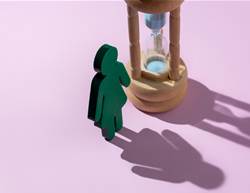- A new book, The Menopause Brain, breaks down what happens in the brain during perimenopause and menopause.
- Many women experience brain fog during this time, leading to the term “menopause brain.”
- Doctors say there are a few things you can do to help with symptoms.
Menopause is a natural life transition, but there’s a lot that’s still unknown about how it impacts various areas of the body. Now, a new book called The Menopause Brain details the impact this change has on women’s brains, and why.
In the book, author and neuroscientist Lisa Mosconi, director of the Weill Cornell Women’s Brain Initiative, notes that more than 60% of women have brain fog at some point during perimenopause (the period before menopause) or menopause. This brain fog, which some may mistake for early signs of dementia, is due to changes happening in the brain during the menopausal transition, she explains.
Mosconi’s new book has raised a lot of questions about so-called “menopause brain” as well as what can be done about it. Mosconi and other doctors break it down.
What happens to the brain during menopause?
During menopause, the body has decreasing levels of oestrogen, explains menopause expert and professor of gynaecology Dr Lauren Streicher. “There are oestrogen receptors throughout the brain and the body,” she says. When oestrogen drops in the body during perimenopause and menopause, it has an impact on the brain.
The brain “controls everything, including body temperature and libido,” Dr Streicher says. When the brain has lessening levels of oestrogen, it can create a feeling of brain fog, she notes.
“Oestrogen plays a crucial role in maintaining brain health, influencing neurotransmitter levels, promoting neuroplasticity, and protecting against oxidative stress and inflammation,” Mosconi says. “As oestrogen declines, women may experience changes in body temperature (a.k.a. hot flashes) sleep, mood, libido, and cognition, which are all brain-regulated functions.”
But it’s “very hard to differentiate what is the cause of this fog; it certainly could be related to the sleep disruptions that many women experience or some of the mood changes they undergo,” says professor of obstetrics and gynaecology Dr Mary Jane Minkin. It also could be related to changes in the hypothalamus, the part of the brain that produces hormones that control body temperature, heart rate, and hunger, among other things, “which we know occur from the decreasing levels of oestrogen,” Dr Minkin says.
Most women in their 40s and 50s have many other stressors they’re dealing with, and all of that can impact the brain, she says.
In fact, Mosconi says that the brain is actually rewiring itself during the menopausal transition. “We’ve made significant progress in demonstrating that menopause changes the brain’s structure, functionality, and even its connectivity in fairly unique ways,” she says. “Overall, menopause is a neurologically active period, which comes with both resilience and vulnerability.”
How does menopause affect memory?
There are a few ways menopause can impact the brain. “Oestrogen declines may lead to alterations in brain structure and function, as well as changes in neurotransmitter production, affecting memory processes such as encoding, retrieval, and consolidation,” Mosconi says. Menopausal symptoms like hot flashes, sleep disturbances, and mood changes can also impact memory function, she says.
You may feel like you can’t focus as well as usual, have trouble concentrating as well as you did in the past, struggle with multi-tasking, and have a shorter attention span, says women’s health expert and gynaecologist Dr Jessica Shepherd. “The main thing is having body awareness. A lot of people are unaware that a lot of these things that occur could be menopause,” Dr Shepherd says.
“Many women report brain fog during the menopausal transition,” Dr Minkin says. “The good news is that it tends to get better as women get through the perimenopausal transition and go onto the post menopausal state.”
Gynaecologist Dr Michael Krychman agrees. “This is very, very common,” he says. “People think they’re losing their minds. They’re really having a lot of difficulty remembering numbers and words. Brain fog is not uncommon as a woman transitions into menopause.”
How to deal with menopause brain
The reason “menopause brain” happens is because the brain is deprived of oestrogen, “so give the brain oestrogen,” Dr Streicher says. Menopausal hormone therapy (MHT), which replaces the oestrogen that the body no longer makes, can help with symptoms of menopause brain, she says.
Many women benefit from taking oestrogen therapy “which is quite safe for most women,” Dr Minkin says. “It will usually help hot flashes, sleep, and mood,” Dr Minkin says. “If women don’t want to take hormonal therapy, there are some herbal products that can help.” Speak to your doctor about your options.
Mosconi also says the following can help if you’re dealing with menopause brain:
- Exercise regularly, “which has been shown to improve cognitive function and mood, and alleviate hot flashes,” she says.
- Prioritise your sleep hygiene.
- Incorporate stress management techniques like mindfulness meditation or deep breathing exercises.
- Have a balanced diet rich in nutrients essential for brain health, including omega-3 fatty acids, antioxidants, fibres, and vitamins.
- Try to avoid or minimise environmental toxins, especially endocrine disruptors.
- Stay mentally active by participating in things that challenge the brain, like puzzles, reading, or learning new skills.
Can you prevent menopause brain?
It’s not clear. “While it may not be possible to completely prevent menopause-related symptoms, the strategies listed above may help mitigate their impact,” Mosconi says. She also points out that the menopause experience “varies greatly” in women.
“While approximately 10% of women report no brain symptoms, many experience some symptoms, and some may have multiple and more severe symptoms,” she says. “The reasons behind these differences are still under investigation.”
But Mosconi says that evidence suggests that having a healthier lifestyle and prioritising your self-care may lead to milder symptoms in menopause. “There’s power in our everyday choices,” she says.
Just don’t be afraid to talk to your doctor about what you’re going through. “If you are experiencing disconcerting brain fog with perimenopause or menopause, do check in with your [gynaecologist] for some advice,” Dr Minkin says.



.jpg&h=90&w=90&c=1&s=1)






